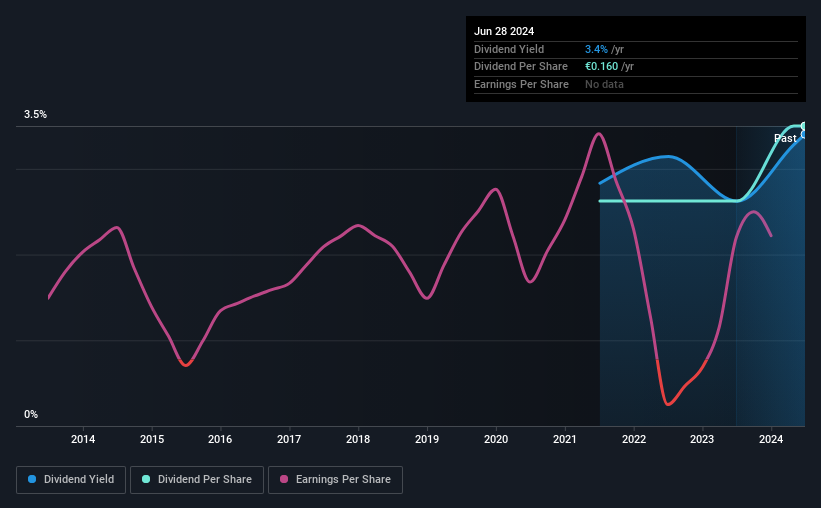Interlife General Insurance Company S.A. (ATH:INLIF) Passed Our Checks, And It's About To Pay A €0.16 Dividend

Interlife General Insurance Company S.A. (ATH:INLIF) stock is about to trade ex-dividend in three days. The ex-dividend date is one business day before a company's record date, which is the date on which the company determines which shareholders are entitled to receive a dividend. It is important to be aware of the ex-dividend date because any trade on the stock needs to have been settled on or before the record date. Meaning, you will need to purchase Interlife General Insurance's shares before the 3rd of July to receive the dividend, which will be paid on the 9th of July.
The company's next dividend payment will be €0.16 per share, on the back of last year when the company paid a total of €0.16 to shareholders. Based on the last year's worth of payments, Interlife General Insurance has a trailing yield of 3.4% on the current stock price of €4.70. Dividends are a major contributor to investment returns for long term holders, but only if the dividend continues to be paid. So we need to check whether the dividend payments are covered, and if earnings are growing.
Check out our latest analysis for Interlife General Insurance
Dividends are usually paid out of company profits, so if a company pays out more than it earned then its dividend is usually at greater risk of being cut. Interlife General Insurance paid out just 22% of its profit last year, which we think is conservatively low and leaves plenty of margin for unexpected circumstances.
Generally speaking, the lower a company's payout ratios, the more resilient its dividend usually is.
Click here to see how much of its profit Interlife General Insurance paid out over the last 12 months.

Have Earnings And Dividends Been Growing?
Companies with consistently growing earnings per share generally make the best dividend stocks, as they usually find it easier to grow dividends per share. If earnings fall far enough, the company could be forced to cut its dividend. Fortunately for readers, Interlife General Insurance's earnings per share have been growing at 15% a year for the past five years.
The main way most investors will assess a company's dividend prospects is by checking the historical rate of dividend growth. In the past three years, Interlife General Insurance has increased its dividend at approximately 10% a year on average. Both per-share earnings and dividends have both been growing rapidly in recent times, which is great to see.
To Sum It Up
Should investors buy Interlife General Insurance for the upcoming dividend? When companies are growing rapidly and retaining a majority of the profits within the business, it's usually a sign that reinvesting earnings creates more value than paying dividends to shareholders. Perhaps even more importantly - this can sometimes signal management is focused on the long term future of the business. In summary, Interlife General Insurance appears to have some promise as a dividend stock, and we'd suggest taking a closer look at it.
So while Interlife General Insurance looks good from a dividend perspective, it's always worthwhile being up to date with the risks involved in this stock. For instance, we've identified 3 warning signs for Interlife General Insurance (1 is concerning) you should be aware of.
A common investing mistake is buying the first interesting stock you see. Here you can find a full list of high-yield dividend stocks.
New: AI Stock Screener & Alerts
Our new AI Stock Screener scans the market every day to uncover opportunities.
• Dividend Powerhouses (3%+ Yield)
• Undervalued Small Caps with Insider Buying
• High growth Tech and AI Companies
Or build your own from over 50 metrics.
Have feedback on this article? Concerned about the content? Get in touch with us directly. Alternatively, email editorial-team (at) simplywallst.com.
This article by Simply Wall St is general in nature. We provide commentary based on historical data and analyst forecasts only using an unbiased methodology and our articles are not intended to be financial advice. It does not constitute a recommendation to buy or sell any stock, and does not take account of your objectives, or your financial situation. We aim to bring you long-term focused analysis driven by fundamental data. Note that our analysis may not factor in the latest price-sensitive company announcements or qualitative material. Simply Wall St has no position in any stocks mentioned.
Have feedback on this article? Concerned about the content? Get in touch with us directly. Alternatively, email editorial-team@simplywallst.com
About ATSE:INLIF
Interlife General Insurance
Operates as a general insurance company for individual and business in Greece.
Flawless balance sheet and good value.


